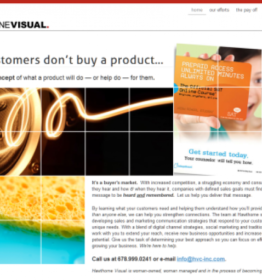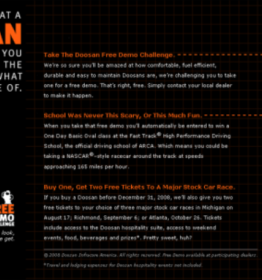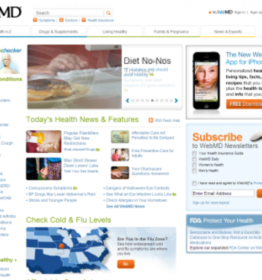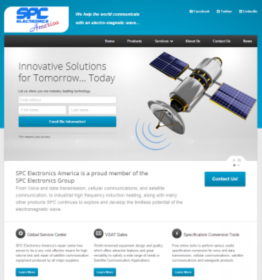RFID Gussied Up With Biosensors
(Wired) Still stinging from failed attempts to introduce radio tags to consumers, retailers and their suppliers are now adding features to the technology to make it appear essential to the safety of the nation’s food supply. As recently as last week, retailers and consumer packaged-goods companies have had to quietly dump efforts to implant radio-frequency identification technology into products or store shelves. The tiny radio transmitters let the companies precisely track the numbers and whereabouts of their inventory and consumers’ purchasing preferences, which worries many privacy advocates.
But many companies are now combining the tags with sensors that can detect the presence of biological and chemical agents, or signal that a perishable item has expired. By doing so, they hope to gussy up the controversial technology as an essential terrorism-fighting tool.
The multifunction RFID tags will track America’s food supply “from birth to the bun,” said one RFID tag maker. With biosensors attached to them, the tags can instantly alert suppliers and retailers to anthrax or other toxins in their products, and possibly make recalls more effective.
In addition, the food companies hope the technology will protect them from lawsuits brought by victims of deliberately contaminated food.
“Antiterrorism designation from the Homeland Security Department will encourage the adoption of this technology by our customers,” said Paul Cheek, CEO of Global Technology Resources, which has developed a supply-chain-auditing system incorporating RFID biosensors.
If Homeland Security designates GTR’s system, called Safe Check, as an antiterrorism technology, it will shield Cheek and his customers from lawsuits if the system fails to work as intended.
The Support Anti-Terrorism by Fostering Effective Technologies (“Safety”) Act of 2002 authorizes the Homeland Security Department to name as “qualified antiterrorism technologies” any devices designed to thwart or mitigate the effects of terrorism. Users of approved devices will enjoy blanket protections from liability lawsuits arising from a terrorist attack.
According to one technology industry lobbyist, the Safety Act was a “backroom deal” brokered by defense contractors, tort reform lawyers and congressional leaders.
But the Safety Act has recently caught the attention of the food industry, which is now funding the development of RFID biosensors and pushing for their coverage under the Safety Act.
Auburn University‘s Detection and Food Safety Center, which is partly funded by food companies, is leading much of the research into RFID biosensors. AU scientists are coating microscopic structures — one a cantilever less than 100 microns long — with bacteriophages, viruses that bind with anthrax and other biological and chemical agents. When an agent binds with the phage coating, the cantilever produces a signal for transmission to a handheld RFID receiver.
AU assistant professor Barton Prorok, who is working on the biosensors, wants to combine the tiny sensor, a transducer and a computer chip on a stamp-size RFID tag, which can operate submerged inside a milk bottle, or in the juice at the bottom of a meat package.
AU is in the early stages of its research, and a bacteriophage-based RFID biosensor is likely many years away. But several food companies have already begun testing RFID biosensors. Golden State Foods, one of McDonald’s largest beef patty providers and its leading sauce supplier, has been testing GTR’s technology for 14 months. Golden State Foods did not respond to a request for an interview.
Another company later this year will begin tagging supply containers for a retail grocery chain. FreshAlert, from RFID chipmaker Infratab, combines RFID tags with temperature sensors and timers, to signal when perishables have become unsafe to eat. Infratab is also negotiating with a brewery and a sausage maker, which are interested in investing in its technology.
The food companies, which say they want to use RFID to make their supply chains more efficient, refused to discuss any food safety and security applications for RFID biosensors.
They may be touchy about their industry’s history of poor record keeping and inept recalls. Less than 30 percent of recalled meats and poultry are ever recovered, according to estimates from food safety experts and the U.S. Department of Agriculture. “They don’t want to remind people of that (NBC News) Dateline episode, either,” said the CEO of one RFID tag manufacturing company. Dateline last year discovered that retail grocers nationwide were endangering their customers’ health by changing the expiration dates on perishable items.
Infratab, GTR and other RFID biosensor companies will begin applying for Homeland Security antiterrorism technology designation as early as next month. But critics of the technology question whether the tags will ever be an effective tool for recalling contaminated goods.
“The retailers used the same argument — faster recalls — as a justification for customer loyalty cards,” said Liz McIntyre, a spokeswoman for the anti-RFID privacy group CASPIAN. “But we know of no product recalls that have ever been made with customer loyalty cards.”
To make recalls based on information from RFID biosensors, food retailers will have to record the personal data of every shopper, said McIntyre, something consumers may not welcome.
“Consumers will just have to ask themselves if it’s worth it to sacrifice their privacy for this technology, because it’s something the industry wants.”




















